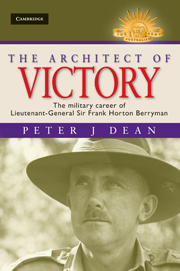Book contents
- Frontmatter
- Contents
- Maps
- Illustrations
- Abbreviations
- Acknowledgements
- Introduction
- PART 1 THE MAKING OF A GENERAL 1894–1939
- 1 The foundations of a military career 1894–1915
- 2 The Western Front 1915–18
- 3 The bitter-sweet years 1919–39
- PART 2 FORGING A REPUTATION
- PART 3 THE ARCHITECT OF VICTORY
- PART 4 THE POST-WAR WORLD 1945–81
- Conclusion
- Notes
- Select bibliography
- Index
3 - The bitter-sweet years 1919–39
from PART 1 - THE MAKING OF A GENERAL 1894–1939
Published online by Cambridge University Press: 05 January 2012
- Frontmatter
- Contents
- Maps
- Illustrations
- Abbreviations
- Acknowledgements
- Introduction
- PART 1 THE MAKING OF A GENERAL 1894–1939
- 1 The foundations of a military career 1894–1915
- 2 The Western Front 1915–18
- 3 The bitter-sweet years 1919–39
- PART 2 FORGING A REPUTATION
- PART 3 THE ARCHITECT OF VICTORY
- PART 4 THE POST-WAR WORLD 1945–81
- Conclusion
- Notes
- Select bibliography
- Index
Summary
At the end of the Great War the AIF was demobilised with the greatest possible speed, and Australian society turned its attention away from the military towards civil endeavours. The war had exhausted the people: 60 000 war dead, two bitterly fought conscription plebiscites, and an enormous public debt caused by the war, led to calls for immediate reductions in the military and a refocusing of the nation towards the development of Australian society. The First World War was, after all, the ‘War to End all Wars’, and the bitter memories of the casualties and suffering led to a genuine belief in disarmament and peace.
Cuts to military spending were popular with the electorate and, after the end of compulsory military service, a member of the militia was, in the words of Gavin Long, Australia's Official Historian of the Second World War, ‘likely to be regarded by his acquaintances as a peculiar fellow with an eccentric taste for uniforms and the exercise of petty authority’: ‘Peace-time military service conferred little prestige…[and] Soldiers and Soldiering were in particular bad odour.’ In the post-war period the real value of the military in Australian society was not in militarism and the professional military caste, but rather in the ‘enormous value of being a “returned serviceman”’.
Persuasive in the motivation to reduce the army was a popular narrative about the prowess of the Australian soldier during the First World War: In parliament D.C. McGrath (Labor) argued that the war proved that Australians with no military experience were, after a month or two of training, ‘equal to if not superior to any other troops’.
- Type
- Chapter
- Information
- The Architect of VictoryThe Military Career of Lieutenant General Sir Frank Horton Berryman, pp. 47 - 68Publisher: Cambridge University PressPrint publication year: 2011



